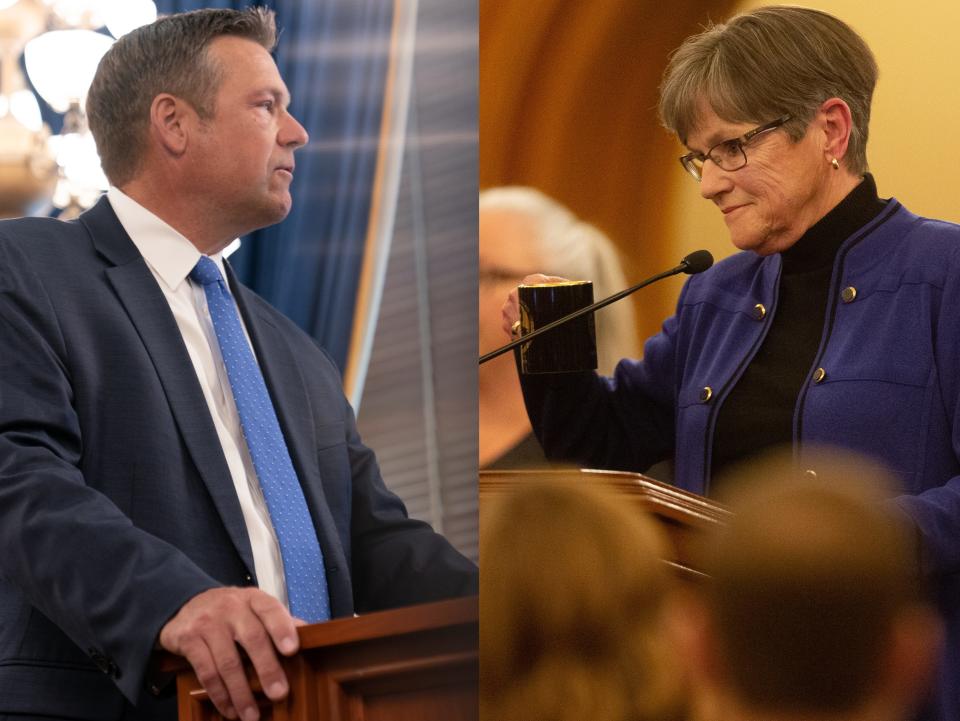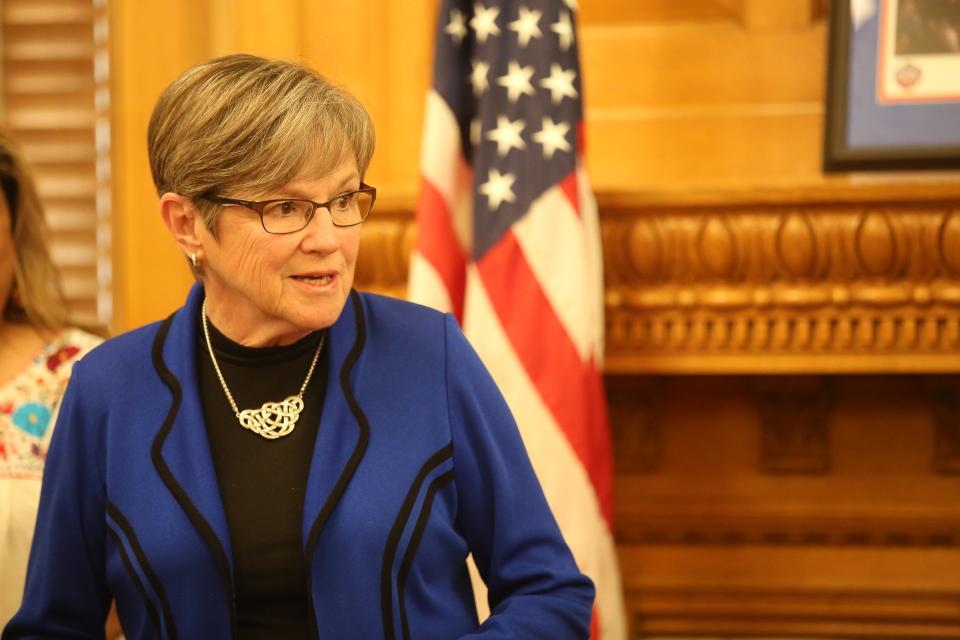Gov. Laura Kelly says Kansas to allow gender marker changes, defying Kris Kobach analysis
- Oops!Something went wrong.Please try again later.
- Oops!Something went wrong.Please try again later.
Gov. Laura Kelly's administration said Thursday it would defy in part legal analysis from Attorney General Kris Kobach on a looming state law and continue to allow transgender Kansans to change the gender marker on their birth certificates or driver's licenses.
Kobach on Monday said he believed that Senate Bill 180 should require the state to revert the gender marker on driver's licenses or birth certificates for transgender individuals back to their sex assigned at birth, undoing years of efforts by trans residents to change those documents.
But while Kelly said she would direct other state agencies to follow SB 180 "according to their legal counsel’s interpretation of the law," that would not include gender marker changes.
"While my administration and the Attorney General’s Office have had many conversations about the law, KDHE and KDOR disagree about its impacts on their operations and will instead keep in place their policies regarding gender markers on birth certificates and driver’s licenses," Kelly said in a statement.

This puts Kelly and Kobach on a likely collision course for a court battle, with the attorney general quickly putting out a statement saying "we will see her in court."
"The Legislature passed SB 180 and overrode Governor Kelly's veto specifically to ensure that those documents reflect biological sex at birth," Kobach said. "The Governor doesn’t get to veto a bill and then ignore the Legislature’s override. She is violating her oath of office to uphold Kansas law."
The new law, which takes effect on July 1, changes definitions in state law to define "male" and "female" in accordance with a person's sex assigned at birth.
News comes as hundreds of Kansans change their ID documents
While other impacts of the bill could surface, the most pressing debate has been over its impact on identification documents.
Since 2019, more than 1,300 residents have changed the gender marker on their birth certificate or driver's license, according to data from the Kansas Department of Health and Environment and the Kansas Department of Revenue.
Since the Legislature voted to enact SB 180 over Kelly's veto in April, legal and transgender rights groups have urged residents to change their ID documents.
In 2023 alone, there have been twice as many birth certificate gender marker changes as the year prior, though the changes could also have been made to correct an error when a baby was born or update an intersex individual initially identified as having an unknown gender.
KDHE and KDOR posted notices to their websites Thursday afternoon notifying residents of their decision.
Kobach's analysis of the bill would not only bar future gender marker changes but would also force the state to effectively go into its internal database to switch any past changes back to an individual's sex assigned at birth.
Kelly's office said such a move would be administratively difficult, however, as KDHE doesn't track whether a birth certificate was changed due to an error or because the person requested the move. Individuals who changed their birth certificate out-of-state and move to Kansas would also be difficult to track.
Proponents of the bill have said that restrictions on limiting an individual from changing their gender marker were an intended element of the bill, though much of the debate in the Legislature centered on its impacts on transgender individuals using restrooms and other public facilities.
Transgender individuals have said the bill effectively erases them from society. Experts say that mismatched genders on identification documents can make accessing housing and social services a challenge, as well as opening transgender people up to harassment and, possibly, outing them.
"Pushing this law sends the message that Kansas hates trans people," Leo McDaniel, a Topeka resident, said at an anti-SB 180 rally last month.
Laura Kelly and Kris Kobach on track for likely legal battle over gender markers

The move from Kelly sets the stage for a likely legal battle, though one has already been brewing.
On Friday, Kobach asked a federal judge to undo a legally binding agreement from 2019 that allowed transgender Kansans to change the gender marker on their birth certificates, settling a year-long court battle.
The state, Kobach, could uphold either that document or SB 180 — but not both.
But there are open legal questions, including whether Kobach can seek to re-open the case on behalf of the three state officials named in the lawsuit. The Kelly administration had already indicated it believed the 2019 agreement should remain in place for at least the time being.
More: AG Kris Kobach and Gov. Laura Kelly disagree on impact of looming Kansas transgender law
A federal judge has not yet weighed in on Kobach's request.
Kelly's office did say that they concurred with other aspects of Kobach's interpretation of the law, including a belief that it would not require transgender individuals to use the restroom or public facility that aligns with their sex assigned at birth statewide.
Kobach has said he believes that local governments could pass their own variation of a "bathroom bill" and have some modicum of legal protection.
SB 180 also will not impact how any state prisoners are housed, Kelly's office said.
This article originally appeared on Topeka Capital-Journal: Laura Kelly says Kansas to allow gender marker changes for trans people
